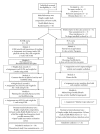Weight Gain Prevention for College Freshmen: Comparing Two Social Cognitive Theory-Based Interventions with and without Explicit Self-Regulation Training
- PMID: 22778919
- PMCID: PMC3384957
- DOI: 10.1155/2012/803769
Weight Gain Prevention for College Freshmen: Comparing Two Social Cognitive Theory-Based Interventions with and without Explicit Self-Regulation Training
Abstract
The college transition represents a critical period for maintaining a healthy weight, yet intervention participation and retention represent significant challenges. The objective of this investigation was to evaluate the preliminary efficacy and acceptability of two interventions to prevent freshman weight gain. One intervention provided opportunities to improve outcome expectations and self-efficacy within a social cognitive theory framework (SCT), while the other targeted the same variables but focused on explicit training in self-regulation skills (SCTSR). Methods. Freshmen (n = 45) aged >18 years were randomized to a 14-week intervention, SCT or SCTSR; both included online modules and in-class meetings. Of the 45 students randomized, 5 withdrew before the classes began and 39 completed pre- and posttesting. Primary outcomes included body weight/composition, health behaviors, and program acceptability. Analyses included independent sample t-tests, repeated measures ANOVA, and bivariate correlational analyses. Results. Body weight increased over the 14-week period, but there was no group difference. Percent body fat increased in SCTSR but not SCT (mean difference: SCTSR, +1.63 ± 0.52%; SCT, -0.25 ± 0.45%; P = 0.01). Class attendance was 100% (SCTSR) and 98% (SCT); SCTSR students (>50%) remarked that the online tracking required "too much time." Conclusions. The intervention was well received, although there were no improvements in weight outcomes.
Figures
References
-
- Hill JO, Wyatt HR, Reed GW, Peters JC. Obesity and the environment: where do we go from here? Science. 2003;299(5608):853–855. - PubMed
-
- Anderson DA, Shapiro JR, Lundgren JD. The freshman year of college as a critical period for weight gain: an initial evaluation. Eating Behaviors. 2003;4(4):363–367. - PubMed
-
- Levitsky DA, Halbmaier CA, Mrdjenovic G. The freshman weight gain: a model for the study of the epidemic of obesity. International Journal of Obesity. 2004;28(11):1435–1442. - PubMed
-
- Racette SB, Deusinger SS, Strube MJ, Highstein GR, Deusinger RH. Weight changes, exercise, and dietary patterns during freshman and sophomore years of college. Journal of American College Health. 2005;53(6):245–251. - PubMed
Grants and funding
LinkOut - more resources
Full Text Sources


